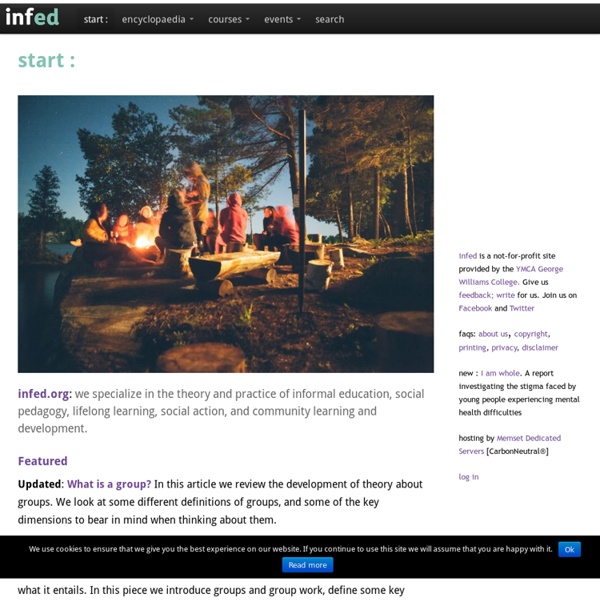Learning, education and community
Featured Updated: What is a group? In this article we review the development of theory about groups. We look at some different definitions of groups, and some of the key dimensions to bear in mind when thinking about them. Updated: What is group work? Updated: What is teaching? In the archives: Community participation, community development and non-formal education. In the archives: Radical community education. Explore Head for the different sections on ideas, thinkers and innovators and practice. Check out what’s new. Visit our archive of materials that illuminate the development of informal education, community learning and development, lifelong learning and social pedagogy. Browse material within different categories. Scroll through the main index. Acknowledgements: Photo by Tegan Mierle on Unsplash
Informal learning: theory, practice and experience
contents: introduction · informal learning · non-formal learning · tacit knowledge · situated and distributed learning · informal education · conclusion · references · links Informal learning should no longer be regarded as an inferior form of learning whose main purpose is to act as the precursor of formal learning; it needs to be seen as fundamental, necessary and valuable in its own right, at times directly relevant to employment and at other times not relevant at all. (Coffield 2000: 8) We must move away from a view of education as a rite of passage involving the acquisition of enough knowledge and qualifications to acquire and adult station in life. The point of education should not be to inculcate a body of knowledge, but to develop capabilities: the basic ones of literacy and numeracy as well as the capability to act responsibly towards others, to take initiative and to work creatively and collaboratively. Introduction Informal learning – an administrative concept Tacit knowledge
Carl Rogers, core conditions and education
contents: introduction · core conditions · carl rogers on education · rogers’ influence · further reading and references · links · how to cite this article Carl Ransom Rogers (1902 – 1987) was born in Oak Park, Illinois, and is best known as the founder of ‘client-centred’ or ‘non-directive’ therapy. Rogers initially studied theology – and as part of his studies acted as the pastor in a small church in Vermont. Core conditions Thorne argues that it is not too simplistic to, ‘affirm that the whole conceptual framework of Carl Rogers rests on his profound experience that human beings become increasingly trustworthy once they feel at a deep level that their subjective experience is both respected and progressively understood’ (1992: 26). Exhibit 1: Carl Rogers on the interpersonal relationship in the facilitation of learning What are these qualities, these attitudes, that facilitate learning? Realness in the facilitator of learning. Prizing, acceptance, trust. Empathic understanding.
The Cost Of Living Worldwide
Hand to Head
We have a dream, help people live their dreams. Many need a chance or just a hand, your hand Turning abilities into skills With your essential support, we plan to launch our expert platform focused on abilities evaluation, educational enrichment and professional enhancement. Abilities assessment (detection, evaluation)Base building (education, training, development) Competence (skills, profession) Our project can be primarily helpful to:ChildrenTeenagers StudentsUnemployed individualsUnsatisfied professionals We intend to integrate standardized, validated, well-known assessment questionnaires and techniques and practices into an innovative, thorough, structured, new approach especially targeting: Cognitive abilities (intelligence, reasoning)Giftedness (talents, capacities, potentials)Personality traitsInterpersonal-Social skillsIntercutural skillsCompetence abilitiesProfessional skills Getting to know more about strengths and deficiencies is a crucial, introductory, first step.
Related:
Related:



